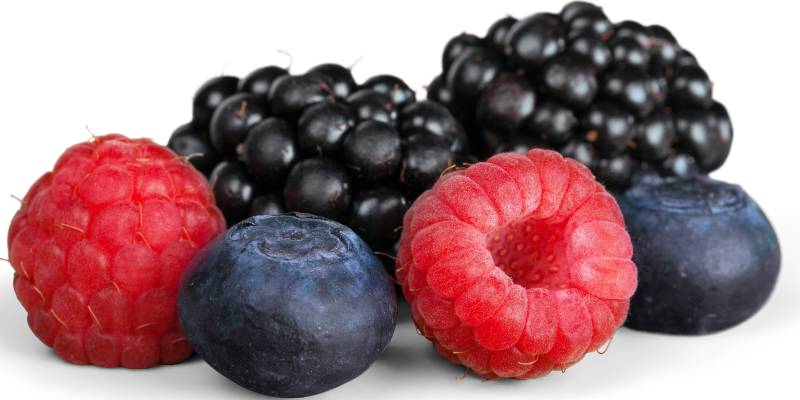Flavonoids: How They Help Improve Memory and Reduce Forgetfulness
Advertisement
Memory loss and forgetfulness are common concerns as we age, but did you know that certain natural compounds could play a significant role in keeping your brain sharp? Flavonoids, powerful antioxidants found in various foods, are emerging as a promising solution to improve memory and reduce forgetfulness.
By incorporating flavonoid-rich foods into your diet, you may boost your cognitive health and enhance your brain's ability to retain information. In this article, we learn how flavonoids work and how they can help improve your memory and mental clarity.
What Are Flavonoids?
Flavonoids are a diverse group of plant compounds found in fruits, vegetables, grains, and beverages like tea and wine. They are part of a larger group known as polyphenols, which are known for their antioxidant and anti-inflammatory properties. Flavonoids are responsible for the vibrant colors of many fruits and vegetables and play a key role in protecting plants from environmental stresses. In humans, they help neutralize free radicals, reduce inflammation, and promote healthy circulation, all of which support brain function and memory.
How Flavonoids Improve Memory and Reduce Forgetfulness?
Flavonoids are more than just antioxidants—they actively contribute to brain health in multiple ways. Below are the key ways flavonoids help improve memory and reduce forgetfulness:
- Enhancing Blood Flow to the Brain:
One of the most important effects of flavonoids on memory is their ability to improve blood flow to the brain. Enhanced circulation ensures that your brain receives the oxygen and nutrients it needs to function at its best. With increased blood flow, brain cells (neurons) are better able to communicate with one another, improving overall brain function, including memory, attention, and cognitive processing.
- Reducing Inflammation in the Brain:
Chronic inflammation in the brain can contribute to cognitive decline and memory problems. Flavonoids, particularly those found in berries, citrus fruits, and dark chocolate, have potent anti-inflammatory effects. By reducing inflammation, flavonoids help protect brain cells from damage and maintain the health of the hippocampus—a part of the brain crucial for forming new memories.
- Protecting Neurons from Damage:
Flavonoids are known to provide neuroprotective benefits. They help safeguard neurons from oxidative stress, which can damage brain cells and impair memory. This protection is particularly important as we age, as the brain becomes more vulnerable to oxidative damage. The antioxidants in flavonoids work to combat free radicals, thus preventing neuronal damage and reducing the risk of memory loss.
- Promoting Neurogenesis:
Neurogenesis refers to the process of creating new neurons in the brain. Flavonoids, particularly those found in dark chocolate and certain fruits like apples and blueberries, have been shown to promote neurogenesis in the hippocampus. The creation of new brain cells helps improve memory retention and learning abilities, supporting better cognitive function as we age.
Top Flavonoid-Rich Foods to Improve Memory:
To harness the memory-boosting benefits of flavonoids, it's essential to include flavonoid-rich foods in your daily diet. Here are some top foods that can help improve memory and reduce forgetfulness:
- Berries (Blueberries, Strawberries, Blackberries):
Berries, especially blueberries, are packed with anthocyanins, a type of flavonoid with potent antioxidant and anti-inflammatory properties. Studies have shown that consuming berries regularly can improve short-term memory, delay cognitive decline, and protect against age-related memory loss.

- Citrus Fruits (Oranges, Grapefruits, Lemons):
Citrus fruits like oranges and grapefruits are rich in flavonoids, particularly flavanones, which have been linked to better cognitive performance. These fruits support brain health by reducing oxidative stress and inflammation while also improving memory and overall cognitive function.
- Dark Chocolate:
Dark chocolate, with a cocoa content of at least 70%, is a rich source of flavonoids. Flavanols have been found to improve blood flow to the brain, reduce oxidative stress, and enhance memory. Consuming moderate amounts of dark chocolate may also boost mood and mental clarity.
- Apples:
Apples contain a type of flavonoid called quercetin, which has been shown to enhance memory function and protect against cognitive decline. Eating apples regularly can help improve memory retention and reduce forgetfulness.
- Green Tea:
Green tea is loaded with catechins, a type of flavonoid linked to improved memory, focus, concentration, and mental clarity. Drinking green tea regularly can help maintain cognitive function, enhance brain health, and reduce the risk of age-related memory loss.
- Red Wine:
Red wine, when consumed in moderation, is a good source of flavonoids like resveratrol. Resveratrol has been shown to improve memory and protect against neurodegenerative diseases.

Other Ways to Boost Memory and Reduce Forgetfulness:
In addition to eating flavonoid-rich foods, there are other lifestyle changes you can make to improve memory and cognitive function. These include:
- Regular Exercise:
Physical activity, especially aerobic exercise, helps improve blood flow to the brain and stimulates the production of new brain cells. Exercise also enhances cognitive performance, including memory and learning abilities.
- Adequate Sleep:
Sleep is essential for memory consolidation. During deep sleep, the brain processes and stores information from the day. To support memory function, aim for 7-9 hours of quality sleep each night.
- Mental Stimulation:
Engaging in mentally stimulating activities like reading, puzzles, and learning new skills can improve brain function and prevent memory decline. Challenge your brain regularly to keep it sharp.
- Stress Management:
Chronic stress can impair memory and cognitive function. To protect your brain and enhance memory, practice stress-reducing techniques such as meditation, mindfulness, or yoga.
Conclusion
Flavonoids significantly improve memory and reduce forgetfulness by promoting brain health, protecting neurons, and enhancing blood flow to the brain. Incorporating flavonoid-rich foods such as berries, citrus fruits, dark chocolate, and green tea into your diet can support cognitive function and keep your memory sharp.
Alongside a healthy diet, adopting a lifestyle that includes regular exercise, quality sleep, and mental stimulation will further optimize your brain health and help reduce forgetfulness. Make these simple changes today to support your memory and cognitive well-being for years.
Advertisement












